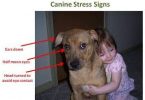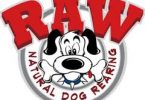All dogs, whether pure bred or mixed breed are at a risk of developing cancer. Cancer is the leading cause of death in dogs, especially senior dogs. There are many different types of canine cancer. The most common forms of canine cancer are mammary, melanoma, bone,connective tissue, skin and oral cancers. How cancer effects a particular dog depends upon the type of cancer and the biological make up of the individual dog.
A diagnosis of cancer can be devastating. While food in itself cannot cure cancer, diet and nutrition can be an important tool in managing this disease. Diet and nutrition are significant to your dogs overall well being. Many of the popular brands of dog food are actually contributing to chronic illnesses in dogs. One of the many cancer causing agents are chemical additives and preservatives in dog food. If your dog has been diagnosed with cancer, we highly recommend feeding your dog a diet without grains, by products, useless fillers, artificial color, chemicals and preservatives. Dogs with cancer should eat a diet that is low in carbohydrates, high in digestible proteins and unsaturated fats. The diet should consist of vegetables high in antioxidant vitamins and minerals, especially iron. The diet should contain minimal quantities of rapidly absorbed simple sugars and contain Omega 3/DHA essential fatty and amino acids.
When dogs have cancer they need more calories in their diet. Cancer can burn energy very quickly and it is important that the dog does not lose lean muscle mass, which can weaken the dogs immune system making it more difficult to combat the effects of cancer. If your dog is undergoing chemotherapy you may need to feed small amounts of complex carbohydrates if they have lost a considerable amount of weight.
The 10 Early Warning Signs of Cancer
( From the American Veterinary Medical Association)
- Abnormal swellings that persist or continue to grow
- Sores that do not heal
- Weight loss
- Loss of appetite
- Bleeding or discharge from any body opening
- Offensive odor
- Difficulty eating or swallowing
- Hesitation to exercise or loss of stamina
- Persistent lameness or stiffness
Difficulty breathing, urinating, or defecating
Holistic Veterinarians recommend multiple nutritional supplements to boost the immune system. They suggest starting the supplements at a lower dose and slowly working up to the recommended levels. The recommendations offered in this section are general guidelines that can be used in virtually all cases, even if your pet is being treated conventionally.If you suspect your dog has cancer, get a full veterinary diagnosis, which includes a full biopsy from a trusted Veterinarian. Just like with humans, it is advised to get a second opinion as well.
Feed a natural diet consisting of whole foods that eliminates chemical additives. Feed live foods, such as probiotic yogurt.
Supplement the diet with antioxidants and protective nutrients. Coenzyme Q10 is an important antioxidant, especially in cases involving mammary and lung tumors. Before starting any program it is recommended to check with your Holistic Veterinarian. Most conventional Veterinarians are not qualified to give holistic advise. The best bet is to select one of the programs below and apply one particular Veterinarians program and work with it.
Dosage: Roger DeHaan, DVM
- Coenzyme Q10-1 milligram daily for each pound of body weight
- Noni-1 capsule daily for each 25 lbs of body weight-May be found at your Health Food Store
- Digestive Enzymes which are used to support the pancreas and digestion
Antioxidants- Cancer, All the Options:A Holistic View of Cancer Therapy-Scanlon
Antioxidants supplements such as vitamins C & E are excellent for supporting your dogs immune system as they offer specific anti cancer benefits. They should be part of any anti cancer strategy. Antioxidants also offer protection against the side effects of chemotherapy.
Omega 3 fatty acids, as found in fish liver oils also offer nutritional support. Studies have shown that they reduce tumor growth and metastasis.
Also recommended are two Chinese herbal formulas made for humans that have anti cancer properties. They are also extremely helpful in dealing with cancer in animals.
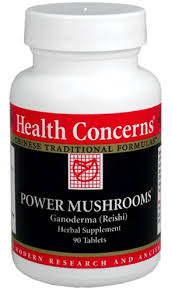 Power Mushrooms Boost immunity in animals with weak defenses.
Power Mushrooms Boost immunity in animals with weak defenses.
Regeneration Formula Offers anticancer properties and helps counteract the side effects of chemotherapy.
Dosage:
- Vitamin C: Slowly build to bowel tolerance level. Sicker animals need more Vitamin C and can tolerate more than healthy animals.
- Vitamin E:
Small Dogs-50 IU (International Units)
Medium Dogs-100 IU
Large Dogs-200 IU
Giant Breeds-400 IU
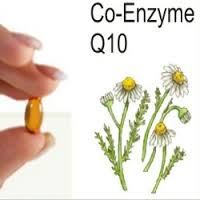 Coenzyme Q10: Watch for signs of gastric upset or decreased appetite
Coenzyme Q10: Watch for signs of gastric upset or decreased appetite
Small-Medium Dogs-20 milligrams
Large Dogs-40 milligrams
Giant Breeds-60 milligrams
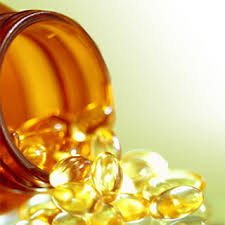 Omega 3 Fatty Acids: Do not use Omega 3 fatty acids that are combined with Omega 6 oils
Omega 3 Fatty Acids: Do not use Omega 3 fatty acids that are combined with Omega 6 oils
Small Dogs-250 milligrams daily
Medium Dogs-500 milligrams daily
Large Dogs-750 milligrams daily
Giant Breeds-1000 milligrams daily
- Power Mushroom and Regeneration-Give twice daily
Dogs under 15 lbs-1/4 to 1/2 tablet
Dogs up to 35 lbs-1 tablet
Dogs up to 50 lbs-1 1/2 tablets
Dogs up to 80 lbs-2 tablets
Giant Breeds-2/1/2-3 tablets
Feeding Tips For Dogs Diagnosed with Cancer
When a dog is diagnosed with cancer, it’s best to plan nutritional support before a serious loss of appetite begins. This can help minimize weight loss or even prevent it. Even if a specific cancer diet isn’t used, dogs with disease will do best on foods that are easily digested, contain protein that’s readily available to the body, provide more meat protein than grain and tastes and smells good
You can improve your dogs appetite by :Warming their food to enhance the aroma and flavor. Just below body temperature seems to be optimal. Be sure to check the food for any hot spots before serving it so they don’t burn their mouth or tongue.
Feed your dog in an area where he’s comfortable and undisturbed by other pets who may be interested in sampling his special diet. However, some dogs are “social eaters” and prefer to have some human or animal company when they eat.
Feed several small meals daily. Your dog may not feel like a eating a larger, single meal.
Separate meals from unpleasant experiences such as giving medication or changing bandages. If your dog learns to associate mealtime with those experiences, he may eat less or stop eating altogether.
Tempt your dog’s appetite by adding small amounts of new delicious, whole and fresh foods.
Stay with your dog and praise or pet him when he shows interest in his meal.
Make sure your dog has access to plenty of fresh, clean water. Dehydration can cause a loss of appetite.
Appetite stimulants can help but only for a limited time. If nausea and vomiting are a problem, consult with your vet about drugs that can help by blocking the effects of the chemicals in the body that activate the brain’s vomiting center. If all else fails, consider tube feeding. It’s not painful and can be of most benefit before your dog loses a significant amount of weight, so don’t hesitate to ask your veterinarian if you should try this. You learn how to feed at the clinic, then continue it at home.
Healthy Homemade recipes for Dogs with Cancer
There are so many forms of cancer, and the number of dogs suffering from cancer is staggering.
Your vet may advise you to be wary of grains, avoid noodles and rice in favor of potatoes and sweet potatoes, squash and pumpkin. These carbohydrates contain more vitamins and minerals, plus they are richer in soluble fiber. Sweet potatoes are one of the more complete foods that are rich in nutrients.
The more dark, leafy green vegetables the dog eats, the better, because of their mineral content, especially iron.
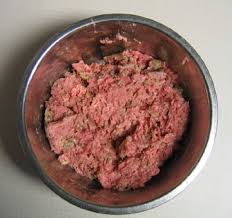

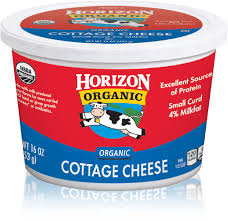
Ingredients:
2 cups ground chicken
4 tablespoons olive oil, divided use
1/2 cup chopped tomatoes
1/2 cup water
1/2 cup cooked chopped broccoli
2 tablespoons cottage cheese
1 tablespoon flax seed oil-Add just prior to serving
Directions:
Brown the chicken in 2 tablespoons olive oil in a large skillet over low heat for approximately 30 minutes or until browned. Saute the tomatoes in the remaining 2 tablespoons olive oil. Add the water and simmer for 25 minutes. Combine all the ingredients in a large bowl. Cool to room temperature, and serve.
Full Week Recipe
14 cups ground chicken (7 pounds)
1/3 cup olive oil
3 1/2 cups chopped tomatoes
3/12 cups cooked chopped broccoli
1/2 cup cottage cheese
Protein: You may substitute any meat for the chicken except pork, which may cause digestive upsets. Use beef, lamb, turkey or liver in the same proportion.
Carbs: If your dog has lost a considerable amount of weight due to chemotherapy, you may add in complex carbs such as 1/2 cup cooked sweet potato, pumpkin, spaghetti squash, or acorn squash.
Recipe courtesy of Rudy Edalati
DogWatch, Volume 11, No.5



